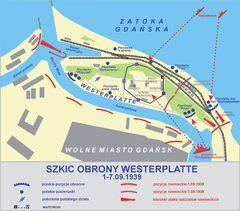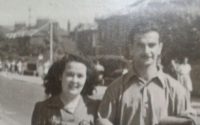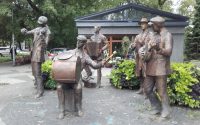‘The Hero of Westerplatte’
My father often spoke of Uncle Heniek when I was growing up. Like my grandfather, Uncle Heniek, full name Henryk Sucharski, held the rank of Major in the Polish Army. I was never sure if he was a blood relative because my father held him in such high regard that the question of family never arose. Henryk Sucharski and my grandfather were both, I believe, in the 20th Infantry Regiment based in Kraków. My grandfather seems to have been his mentor being seven years his senior. Henryk Sucharski rose through the ranks quickly considering he did not appear, from what I understand, to have had a military background. In a future blog I will reveal one theory for this which came to light, when I visited the War Museum in Gdańsk.
How close a family friend was Uncle Heniek? I have in my possession this letter, shown below, which he sent to my father. A rough translation into English follows.
Mjr Sucharski.H. 24.VII.46
Polish Forces C.M.F 106
Rysiuk, my dear boy!
I don’t understand what could have happened that you haven’t written. You didn’t reply to my letter from May this year. I can’t get in contact with Pach Senior (N.B my grandfather Edward Pach). I sent him a few letters and a parcel, but there was no response. It could be that the Allies’ are checking them so much.
A woman has written to me that father is going to join you. I got a letter from Mum ( N.B my grandmother Joanna Pach) as well. She feels better. She is in a better mood now.
Write to me lad.
Love
Henryk
The tone of the letter demonstrates a close relationship with my father. The letter was written on 24th July 1946. Major Henryk Sucharski died of peritonitis five weeks later on 30th August 1946.
My grandfather and grandmother also mention Uncle Heniek in letters to my father. I enclose again an extract from a letter that my grandfather wrote to my father which was published in an earlier blog entitled ‘Veteran of Three Wars ‘
‘Mum has written. Could you look for Henryk Sucharski in England and find out if it’s possible to get Mum back to us. Henryk didn’t write to me at all, I tried to take Mum back through II Corp. I gave them all details, information and it didn’t help. Please help me get Mum back from there through Henryk. She shouldn’t be in those tropics (N.B she was sent by the military authorities to Southern Rhodesia, now Zambia to work after the release form Siberia) over there. Henryk went to these hot countries and sank in the wine and he didn’t do anything. I have a grievance against him.’
By the tone you can sense a bit of tension, as my grandfather would have been worried about my grandmother’s welfare.
My grandmother’s refers to Uncle Heniek a few times in her letters to my father as noted in my blog entitled ‘Letters From Far Places’. He left her some money before he died in Italy in 1946 and this is mentioned in her final letter to my father.
In 2011, Anna Niegodzika, a colleague brought back from her native Kraków a copy of a definitive Polish language biography ‘Major Henryk Sucharski’ by Andrzej Drzycimski in which he makes reference to my grandfather in an interview given by Henryk’s sister inn which she states: ‘Jak byłam panną, to z Brześcia przywiózł mi bardzo ładny materiał na sukienkę. Bardzo ładny materiał elegancka wełna. Wybrała to jednak żona jego kolegi Pacha Edwarda z pułku’. Kolegowali się.
which roughly translates as: ‘When I was a young lady, he brought a very nice material for a dress from Brest. Very nice material, elegant wool. However, he chose it for the wife of his colleague from the regiment, Edward Pach. They were friends.
I recommend this link in the original Polish as it offers a better biographical account of Henryk including the Battle of Westerplatte and the translation to English is perfectly readable. The English link misses out information and makes no reference to the 20th Infantry Regiment. https://pl.wikipedia.org/wiki/Henryk_Sucharski
The Battle of Westerplatte was the first major Polish resistance to the German advance. Westerplatte is located on a peninsula and that is where the Polish forces were surrounded.

They were able to last 5 days during which Major Sucharski suffered a breakdown. His deputy Captain Franciszek Dąbrowski assumed temporary command in heroic fashion. After the war only Major Sucharski was commemorated, largely for political reasons, by the Communist government in Poland as he was of ‘working man’s stock’ whereas Captain Dąbrowski being ‘szlachta’ (meaning gentry), his heroism was largely forgotten. This has now been corrected. The espisode should be commemorated as ‘The Heroes of Westerplatte’.
Henryk Sucharski’s remains were exhumed form the burial place in Naples and re-interred in 1971 at Westerplatte.
At the end of 1939, both of my father’s role models had been detained at Prisoner of War camps for officers. In 1940, my own father would, with thousands of other Polish exiles, enlist in the Polish army, first under French command and then under British. With the end of the war in 1945, came another dilemma for the Polish servicemen under British command – Repatriation or Resettlement. My father chose the latter and this will be the content of next week’s blog.
End


